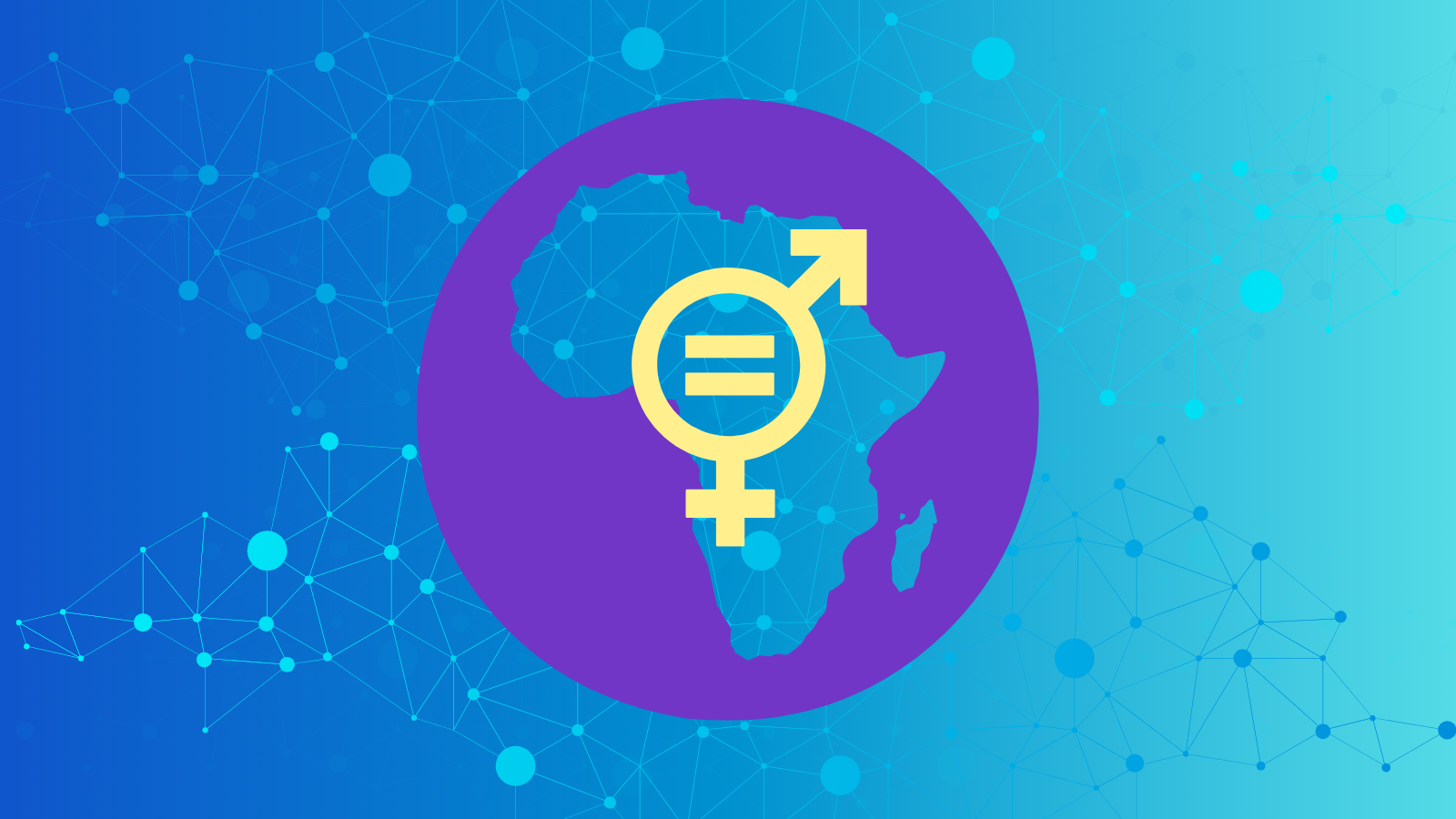Introduction
During my fellowship at the Datasphere Initiative, I am investigating the datasphere concept, which includes various data types and their dynamic connections with human communities and norms, and how it affects gender equality in African AI. This blog post highlights how the datasphere can tackle gender inequalities and support women’s participation in Artificial Intelligence (AI) throughout the continent.
The datasphere includes every digital datum, creating a linked network of information that powers our digital world. AI systems rely significantly on data for learning and decision-making, therefore the organization and control of the datasphere play a crucial role in shaping the effectiveness of these systems. Gender bias, whether deliberate or accidental, can infiltrate AI algorithms through the data they are trained with. Acknowledging this fact, the datasphere is seen as a vital tool for tackling gender equality issues, especially within the growing AI sector in Africa.
Data governance involves supervising, safeguarding, and ethically managing data in a company or system. Strong data governance is crucial in AI to guarantee fairness and equity. This requires creating precise guidelines for gathering, analyzing, and retaining information, aimed at eradicating biases that uphold gender disparities. In African countries, it is crucial to create effective data governance frameworks to avoid the reinforcement of gender biases in AI systems as data infrastructure continues to develop.
Large Language Models in Kenya
Kenya has been leading the way in creating extensive language models to assist with indigenous languages and dialects in the country. Nonetheless, these models encountered difficulties with gender biases at first because they were trained on historical texts that portrayed obsolete gender norms. Kenyan researchers are developing language models that support gender equality by revising training data and including a variety of sources.
The consequences of gender bias in AI go far beyond just numbers. Prejudiced algorithms may result in unjust judgments, maintaining disparities in numerous fields. For instance, a biased hiring algorithm could give preferential treatment to male applicants, worsening gender imbalances in specific industries. Data governance in the data world works as a mechanism to prevent biases, guaranteeing that AI-based decisions are just and unbiased. In African situations, encouraging gender-neutral decision-making with strict data management can lead to substantial societal advancements.
Data Governance in Nigeria
Nigeria’s thriving tech industry has driven advancements in developing data governance frameworks to support the growth of AI. The National Information Technology Development Agency (NITDA) has established rules to ensure data confidentiality and security, crucial for diminishing gender biases. Nigeria strives to build an AI environment that promotes gender equality by prioritizing clear data practices and ethical standards.
Information regarding individuals, such as demographics, preferences, and behavior, plays a crucial role in shaping AI algorithms in the digital arena. If AI models learn from personal data with gender biases, they may continue stereotypes and influence decision-making in important areas like employment, loans, and healthcare. Effective data governance is necessary to purify personal data from biases, establishing an equitable base for AI algorithms. In Africa, it is important to focus on correcting biases in personal data to develop fair AI solutions, especially given the significant gender disparities in the region.
Bias in Healthcare AI in South Africa
In South Africa, healthcare initiatives utilizing AI have shown how personal data gender biases can impact results. Research on the use of AI in diagnosing patients discovered that male patients were frequently given more attention than female patients because of past prejudices present in health data. Healthcare providers are striving to make sure AI systems give fair and unbiased results by using strict data governance measures such as bias audits and inclusive data collection.
In addition to personal data, the datasphere contains non-personal data that may appear harmless but still influences AI results significantly. Examining patterns in non-personal data may inadvertently perpetuate gender stereotypes. In Africa, with diverse cultural and historical backgrounds, it is crucial to regulate and manage all data types carefully to enable responsible data usage and gender-sensitive AI development.
Conclusion
The concept of the datasphere is vital for several reasons. Primarily, it serves as the foundation upon which AI systems are built. Embedding principles of fairness and equality within the datasphere creates a ripple effect that influences all AI applications. Additionally, the datasphere is dynamic, continuously evolving with new data inputs. This presents an opportunity to rectify past biases and shape a fairer future. For Africa, leveraging the datasphere to promote gender equality can transform AI into a powerful tool for social change.
Understanding and mastering the datasphere is not merely a technical necessity but a strategic imperative in the quest for gender equality in AI. By implementing robust data governance, we can dismantle gender biases in both personal and non-personal data, ensuring that AI algorithms contribute to a just and diverse society. As Africa advances in the data landscape and AI, we must harness the potential of the datasphere to shape a future where AI reflects the diversity and equality we aspire to achieve.
In conclusion, it is evident that the datasphere has great potential to promote gender equality in AI throughout Africa. By prioritizing data governance, inclusive techniques, and strict regulations, we can guarantee that AI systems are created and utilized in a manner that serves all genders equally. As active participants in this transformative process, let us pledge to create an AI future that is just, inclusive, and representative of the diverse community we imagine.
References
- De La Chapelle, B. and L. Porciuncula (2021), “Hello Datasphere”, Datasphere Initiative Medium, https://medium.com/@thedatasphere/hello-datasphere-towards-a-systems-approach-to-data-governance-d602f96c9e1d
- Chaka, C. (2022). Digital marginalization, data marginalization, and algorithmic exclusions: a critical southern decolonial approach to datafication, algorithms, and digital citizenship from the Souths. Journal of E-Learning and Knowledge Society, 18(3), 83-95. https://doi.org/10.20368/1971-8829/1135678
- Janssen, M., Brous, P., Estevez, E., Barbosa, L. S., & Janowski, T. (2020). Data governance: Organizing data for trustworthy Artificial Intelligence. Government information quarterly, 37(3), 101493.
- Baguma, R., Namuwaya, H., Nakatumba-Nabende, J., Rashid, Q.M. (2024). Examining Potential Harms of Large Language Models (LLMs) in Africa. In: Tchakounte, F., Atemkeng, M., Rajagopalan, R.P. (eds) Safe, Secure, Ethical, Responsible Technologies and Emerging Applications. SAFER-TEA 2023. Lecture Notes of the Institute for Computer Sciences, Social Informatics and Telecommunications Engineering, vol 566. Springer, Cham. https://doi.org/10.1007/978-3-031-56396-6_1
- Tang, K., Zhou, W., Zhang, J., Liu, A., Deng, G., Li, S., … & Yu, N. GenderCARE: A Comprehensive Framework for Assessing and Reducing Gender Bias in Large Language Models.
- Ezeugwa, F. A., Olaniyi, O. O., Ugonnia, J. C., Arigbabu, A. S., & Joeaneke, P. C. (2024). Artificial Intelligence, Big Data, and Cloud Infrastructures: Policy Recommendations for Enhancing Women’s Participation in the Tech-Driven Economy. Journal of Engineering Research and Reports, 26(6), 1-16.
- Naidoo S, Bottomley D, Naidoo M, Donnelly D, Thaldar DW. Artificial intelligence in healthcare: Proposals for policy development in South Africa. S Afr J Bioeth Law. 2022 Aug 5;15(1):11-16. doi: 10.7196/sajbl.2022.v15i1.797. Epub 2022 May 19. PMID: 36061984; PMCID: PMC9439582.




